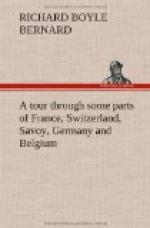It is endeavoured by a proclamation of the Prince Sovereign to restore the Flemish language in all public acts and pleadings at law, to the exclusion of the French, which during the union of Belgium with France, was alone allowed to be used, and pains were taken that in all schools the French language only should be taught. But it is a difficult task, to overcome the partiality of a people for their ancient dialect, and the Flemish language is still used by the lower classes even in those parts of Flanders which have been united for above a century to France. At this day the difference between the two nations is not altogether done away.
The scheme of again uniting Belgium and the left bank of the Rhine to France, is here perpetually introduced. The French talk of the oppressed state of the Belgians, and of the vast number of ordinary, extraordinary, and indirect imposts to which they are subject, and conclude that they must wish to become again the subjects of France, as if they would by that means escape taxation. That they would rather be subject to the mild government of Louis XVIII. than to the oppressive tyranny of Buonaparte, I can easily conceive; but is it unnatural that they should be desirous of existing as an independent nation, under a government of their own? Yet were it ascertained beyond dispute, that the wishes of the Belgians are such as the French represent them, surely the general interests of Europe, and the preservation of that balance of power so essential to its permanent tranquillity, would forbid the further extension of France, which might again reassume that preponderance which it has cost the other powers so much to reduce. I am, however, inclined to think, that the wishes of the Belgians are not such as they are represented; but the French knowing a little, presume a good deal, and so jump to a conclusion.
The merchants here seem to expect that their city will obtain the privileges of a free port, which have been lately granted to Marseilles, but upon what grounds their hopes are founded, I did not distinctly understand.
Dunkirk was at one period subject to England; being taken in 1658, it continued an English garrison until sold by that needy monarch Charles the Second, to Louis the Fourteenth, in 1662. The odium of this transaction was one of the causes of the disgrace of that great statesman, Lord Clarendon, and a house which he was then building, obtained the popular appellation of Dunkirk House. In the possession of so enterprising and ambitious a sovereign as Louis, Dunkirk became so formidable by its fortifications, that the demolition of them was deemed essential to the interests of England, and was accordingly insisted on by the Treaty of Utrecht, 1713; but by the treaty of 1783, the article against its being fortified was annulled, and although several works have been constructed since that period, it has by no means re-assumed its




